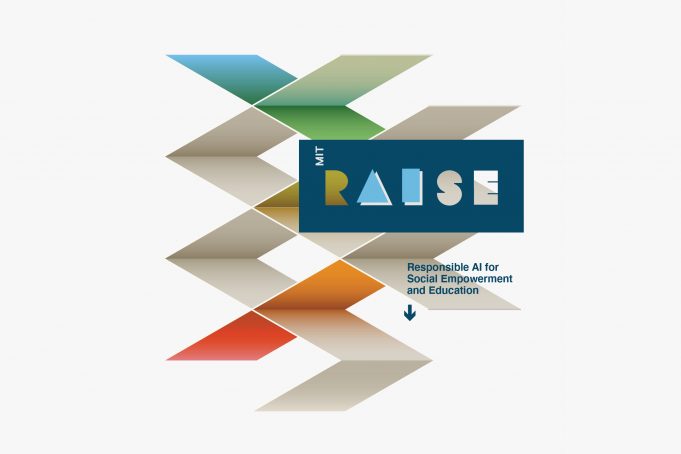Helping students of all ages flourish in the era of artificial intelligence

Responsible AI for Social Empowerment and Education (RAISE) seeks to empower more people to participate in, and benefit from, AI.
A new cross-disciplinary research initiative at MIT aims to promote the understanding and use of AI across all segments of society. The effort, called Responsible AI for Social Empowerment and Education (RAISE), will develop new teaching approaches and tools to engage learners in settings from preK-12 to the workforce.
“People are using AI every day in our workplaces and our private lives. It’s in our apps, devices, social media, and more. It’s shaping the global economy, our institutions, and ourselves. Being digitally literate is no longer enough. People need to be AI-literate to understand the responsible use of AI and create things with it at individual, community, and societal levels,” says RAISE Director Cynthia Breazeal, a professor of media arts and sciences at MIT.
“But right now, if you want to learn about AI to make AI-powered applications, you pretty much need to have a college degree in computer science or related topic,” Breazeal adds. “The educational barrier is still pretty high. The vision of this initiative is: AI for everyone else — with an emphasis on equity, access, and responsible empowerment.”
Headquartered in the MIT Media Lab, RAISE is a collaboration with the MIT Schwarzman College of Computing and MIT Open Learning. The initiative will engage in research coupled with education and outreach efforts to advance new knowledge and innovative technologies to support how diverse people learn about AI as well as how AI can help to better support human learning. Through Open Learning and the Abdul Latif Jameel World Education Lab (J-WEL), RAISE will also extend its reach into a global network where equity and justice are key.
The initiative draws on MIT’s history as both a birthplace of AI technology and a leader in AI pedagogy. “MIT already excels at undergraduate and graduate AI education,” says Breazeal, who heads the Media Lab’s Personal Robots group and is an associate director of the Media Lab. “Now we’re building on those successes. We’re saying we can take a leadership role in educational research, the science of learning, and technological innovation to broaden AI education and empower society writ large to shape our future with AI.”
In addition to Breazeal, RAISE co-directors are Hal Abelson, professor of computer science and education; Eric Klopfer, professor and director of the Scheller Teacher Education Program; and Hae Won Park, a research scientist at the Media Lab. Other principal leaders include Professor Sanjay Sarma, vice president for open learning. RAISE draws additional participation from dozens of faculty, staff, and students across the Institute.
“In today’s rapidly changing economic and technological landscape, a core challenge nationally and globally is to improve the effectiveness, availability, and equity of preK-12 education, community college, and workforce development. AI offers tremendous promise for new pedagogies and platforms, as well as for new content. Developing and deploying advances in computing for the public good is core to the mission of the Schwarzman College of Computing, and I’m delighted to have the College playing a role in this initiative,” says Daniel Huttenlocher, dean of the MIT Schwarzman College of Computing.
The new initiative will engage in research, education, and outreach activities to advance four strategic impact areas: diversity and inclusion in AI, AI literacy in preK-12 education, AI workforce training, and AI-supported learning. Success entails that new knowledge, materials, technological innovations, and programs developed by RAISE are leveraged by other stakeholder AI education programs across MIT and beyond to add value to their efficacy, experience, equity, and impact.
RAISE will develop AI-augmented tools to support human learning across a variety of topics. “We’ve done a lot of work in the Media Lab around companion AI,” says Park. “Personalized learning companion AI agents such as social robots support individual students’ learning and motivation to learn. This work provides an effective and safe space for students to practice and explore topics such as early childhood literacy and language development.”
Diversity and inclusion will be embedded throughout RAISE’s work, to help correct historic inequities in the field of AI. “We’re seeing story after story of unintended bias and inequities that are arising because of these AI systems,” says Breazeal. “So, a mission of our initiative is to educate a far more diverse and inclusive group of people in the responsible design and use of AI technologies, who will ultimately be more representative of the communities they will be developing these products and services for.”
This spring, RAISE is piloting a K-12 outreach program called Future Makers. The program brings engaging, hands-on learning experiences about AI fundamentals and critical thinking about societal implications to teachers and students, primarily from underserved or under-resourced communities, such as schools receiving Title I services.
To bring AI to young people within and beyond the classroom, RAISE is developing and distributing curricula, teacher guides, and student-friendly AI tools that enable anyone, even those with no programming background, to create original applications for desktop and mobile computing. “Scratch and App Inventor are already in the hands of millions of learners worldwide,” explains Abelson. “RAISE is enhancing these platforms and making powerful AI accessible to all people for increased creativity and personal expression.”
Ethics and AI will be a central component to the initiative’s curricula and teaching tools. “Our philosophy is, have kids learn about the technical concepts right alongside the ethical design practices,” says Breazeal. “Thinking through the societal implications can’t be an afterthought.”
“AI is changing the way we interact with computers as consumers as well as designers and developers of technology,” Klopfer says. “It is creating a new paradigm for innovation and change. We want to make sure that all people are empowered to use this technology in constructive, creative, and beneficial ways.”
“Connecting this initiative not only to [MIT’s schools of] engineering and computing, but also to the School of Humanities, Arts and Social Sciences recognizes the multidimensional nature of this effort,” Klopfer adds.
Sarma says RAISE also aims to boost AI literacy in the workforce, in part by adapting some of their K-12 techniques. “Many of these tools — when made somewhat more sophisticated and more germane to the adult learner — will make a tremendous difference,” says Sarma. For example, he envisions a program to train radiology technicians in how AI programs interpret diagnostic imagery and, vitally, how they can err.
“AI is having a truly transformative effect across broad swaths of society,” says Breazeal. “Children today are not only digital natives, they’re AI natives. And adults need to understand AI to be able to engage in a democratic dialogue around how we want these systems deployed.”


